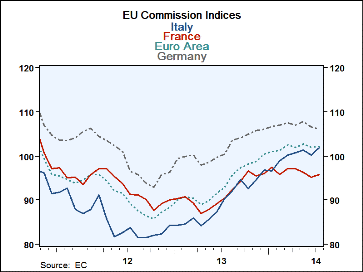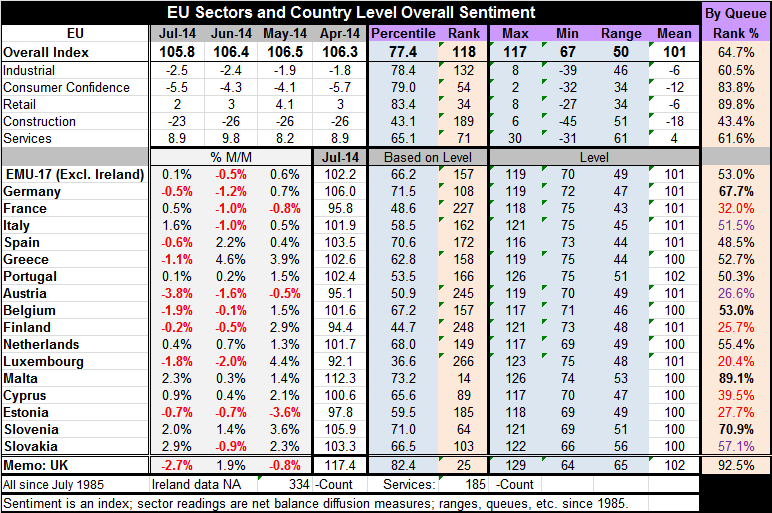 Global| Jul 30 2014
Global| Jul 30 2014EU Indices Take a Step Back in July as the EMU Reading Steps Up
Summary
The EU index of economic sentiment fell to 105.8 in July from 106.4 in June. The comparable index for the EMU economies rose by 0.1% to a lesser standing of 102.2. For the EU members in July the industrial index slipped slightly more [...]
 The EU index of economic sentiment fell to 105.8 in July from 106.4 in June. The comparable index for the EMU economies rose by 0.1% to a lesser standing of 102.2.
The EU index of economic sentiment fell to 105.8 in July from 106.4 in June. The comparable index for the EMU economies rose by 0.1% to a lesser standing of 102.2.
For the EU members in July the industrial index slipped slightly more to -2.5 from June's -2.4. Consumer confidence slipped to -5.5 in July from -4.3 in June. The retailing sector was slightly weaker at a value of 2 in July compared to 3 in June. The construction sector improved, rising in July to -23 from a level in June of -26. The services sector continued to show positive growth but slowed to a reading of 8.9 in July from a value of 9.8 in June.
The standing of the overall EU index is in its 64th percentile. That places it in its historic queue and tells us that the index has been higher 36% of the time and lower 64% of the time. Industrial sector queue standing is in its 60th percentile. The construction sector is in its 43rd percentile and the services sector stands in its 61st percentile. These are all moderate readings with the exception of construction that stands below its median value marking it weak. The strong readings are for the retail sector which stands in its 89th percentile and consumer confidence which stands in its 83rd percentile.
Turning to the EMU members, we see declines in economic sentiment in eight of 17 reporting members in July. That compares to declines in 10 members in June. The strongest gains on the month are from Slovakia, Malta and Slovenia, each with gains of over 2%. The weakest readings month-to-month are from Austria that fell by 3.8% and Belgium and Luxembourg, each of which fell by just less than 2%.
In terms of the members queue standings, the strongest standing come from Malta, at its 89th percentile, followed by Slovenia at its 70th percentile and Germany at its 67th percentile. The weakest readings are from Luxembourg, in its 20th percentile, Finland, in its 25th percentile, Austria, in its 26th percentile, and Estonia, in its 27th percentile.
The overall standing for the European Monetary Union is only in its 53rd percentile, leaving it well below the percentile standing of the 64th percentile for the European Union as a whole.
EMU Detail
Industrial confidence for the EMU members stands in the 59th percentile of its historic queue (about the same for the EU as a whole). The strongest component under industrial confidence is employment expectations; its value stands in the 71st percentile of its historic queue. Net strongest reading is for export orders which stand in the 54th percentile. After that, there's overall order volume and the recent production trend; both of which sit just above their respective 51st percentiles. Among the big-four EMU economies, Germany's queue standing is in its 71st percentile and Spain's is at 52nd percentile. After that, both France and Italy are below their median values with Italy in its 47th percentile and France in only its 31st percentile
Despite the irregularities in the EMU, consumer confidence stands in the 71st percentile of its historic queue (below the 83.8% standing for EU as a whole). The two strongest readings are economic situation in the past 12 months, which is higher only 7% of the time and the economic situation expected for the next 12 months, which is higher only 18% of the time. By country, among the largest EMU members, Germany has the best confidence standing with a reading in its 91st percentile, followed by Spain at 74th percentile and Italy in the 63rd percentile. All of these are readings above their respective medians (the median in all cases lies at the 50th percentile). France again comes in with a weak reading in only the 29th percentile of its historic queue. The UK, an EU member not part of the single currency arrangement, has consumer confidence in the top 4% of its historic queue.
Retailing has an 84th percentile standing in the EMU (a bit below the 89.8 percentile reading for the EU as a whole). The current business situation is evaluated as better only 20% of the time. While employment expectations are better only 27% of the time, orders are better only about 29% of the time. These are relatively firm readings for the retail sector. Among the four largest EMU nations, Spain has the highest reading for the retail sector in its 96th percentile, followed by Germany in the 84th percentile, Italy in the 78th percentile, and France in the 62nd percentile. All of these are firm-to-strong readings.
The services sector in the EMU has a very weak reading, standing only in the 43rd percentile of its historic queue (it is much weaker than the 61.6 percentile reading for the EU as a whole). All of its components are relatively weak with the strongest being a 54th percentile reading for the current employment and the 51st percentile reading for the business climate. The big-four EMU members all carry queue standings for the services sector below their respective medians with Germany and Spain at readings of 49, close to their median readings. Italy has a reading of 48, also rather close to its median. But France's services sector has a queue standing in its 23rd percentile in the lowest quartile of its range.
The construction sector is weak. It has a Monetary Union standing in the 31st percentile of its historic queue on a raw score reading of -28 (it is even weaker in the EMU than the 43.4 standing in the EU). All of the components in the construction sector indicator are weak. By country only, Germany has a strong reading for the construction sector in its 83rd percentile. For France, Italy and Spain, all of the readings are below the 40th percentile. For France the reading is in the 14th percentile and for Spain it's in the 20th percentile. The construction sector continues to be a drag on economic output.
On balance, for July, the European Monetary Union is still showing a tendency to expand but at a very tempered reading. Economic settlement reading for all of the EMU is only at a level of 102.2, marking it as the 53rd percentile standing. That's a historic queue reading that is clearly moderate. The standing of the European Union, which contains the EMU members, is considerably stronger than the EMU this month.
We have seen setbacks in some traditional economic measures, and this month, we see weakness in the EMU survey despite having seen strength reported from the Markit private sector surveys. However, as these figures are reported today, there are new sanctions being imposed on Russia and in return Russia is imposing some sanctions on European nations. It's not likely to be a situation to make economic readings any stronger next month.

Robert Brusca
AuthorMore in Author Profile »Robert A. Brusca is Chief Economist of Fact and Opinion Economics, a consulting firm he founded in Manhattan. He has been an economist on Wall Street for over 25 years. He has visited central banking and large institutional clients in over 30 countries in his career as an economist. Mr. Brusca was a Divisional Research Chief at the Federal Reserve Bank of NY (Chief of the International Financial markets Division), a Fed Watcher at Irving Trust and Chief Economist at Nikko Securities International. He is widely quoted and appears in various media. Mr. Brusca holds an MA and Ph.D. in economics from Michigan State University and a BA in Economics from the University of Michigan. His research pursues his strong interests in non aligned policy economics as well as international economics. FAO Economics’ research targets investors to assist them in making better investment decisions in stocks, bonds and in a variety of international assets. The company does not manage money and has no conflicts in giving economic advice.
More Economy in Brief
 Global| Feb 05 2026
Global| Feb 05 2026Charts of the Week: Balanced Policy, Resilient Data and AI Narratives
by:Andrew Cates






